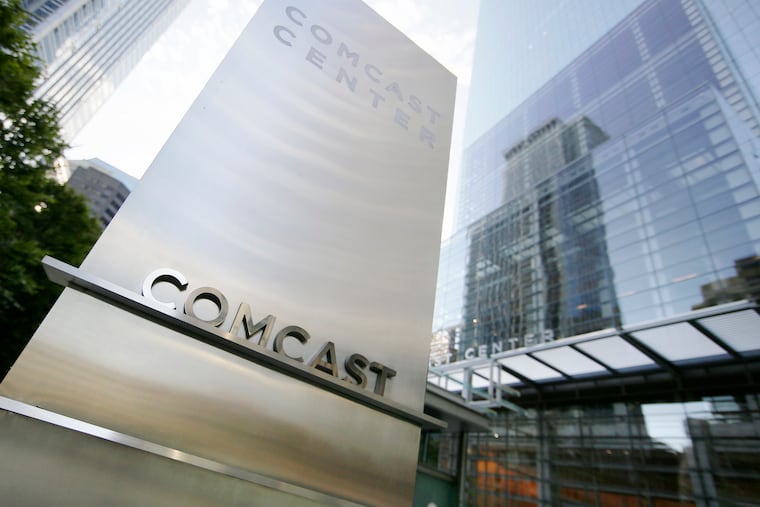Comcast among U.S. companies taking a tough line on campaign donations after election challenge, Capitol takeover
Other large firms, such as Google, Facebook, Microsoft and, locally, the Vanguard Group, halted all political contributions to both Republicans and Democrats.

Comcast Corp. on Monday joined several other major American corporations in taking a tough stance against the 147 Republican politicians who voted against accepting the presidential vote totals — cutting off campaign money to them.
The giant cable firm, one of Philadelphia’s largest employers, condemned “the appalling violence we witnessed at the U.S. Capitol.”
“Our focus,” it said in a statement, “needs to be on working together for the good of the entire nation. Consistent with that view, we will suspend all of our political contributions to those elected officials who voted against certification of the Electoral College votes, which will give us the opportunity to review our political giving policies and practices.”
The funding suspension by Comcast, as well as the same move by Marriott and many other firms, was the most aggressive step in a continuum of campaign-finance action by some of the nation’s biggest companies. Other large firms, such as Google, Facebook, Microsoft and, locally, the Vanguard Group, halted all political contributions to both Republicans and Democrats.
» READ MORE: Where Pa. and N.J. members of Congress stand on impeaching Trump after the Capitol attack
Finance firm such as Goldman Sachs, BlackRock and JP Morgan said they were doing the same. BlackRock told employees in a memo that its decision was spurred by “the horrific events in the nation’s capital.”
But Comcast and Marriott, the world’s largest hotel chain, and others zeroed in on only the GOP vote objectors. The hotel firm said its suspension of giving to 139 Republican U.S. representatives and eight senators was driven by “the destructive events at the Capitol to undermine a legitimate and fair election.”
The Blue Cross Blue Shield Association said it would do the same, pledging to halt giving to “to those lawmakers who voted to undermine our democracy.”
American Express also provided a targeted response, telling its workforce it was halting contributions to the Congress members who voted “to subvert the presidential election results and disrupt the peaceful transition of power.”
Hallmark Cards took an especially pointed line. The card maker’s PAC asked that Sen. Josh Hawley (R., Mo.) and Sen. Roger Marshall (R., Kan.) return its donations. The committee gave $7,000 to Hawley’s campaign and $5,000 to Marshall’s in the last two years. Hawley, in particularly, was a leader in the bid to reject the Electoral College votes for Democratic President-elect Joe Biden.
“Hallmark believes the peaceful transition of power is part of the bedrock of our democratic system, and we abhor violence of any kind,” JiaoJiao Shen, a Hallmark official, said in a statement Monday. “The recent actions of Senators Josh Hawley and Roger Marshall do not reflect our company’s values.”
With myriad regulatory issues in Washington, Comcast is a major political player, known for its heavy campaign giving and lobbying clout. In the last two-year election cycle, the corporation’s PAC gave $916,000 to the 147 U.S House members and senators who voted against certifying Biden as the next president, according to analysis by Center for Responsive Politics.
» READ MORE: House speeds ahead with push to impeach Trump for Capitol insurrection
Comcast’s PAC was seventh among the top 10 PACs in terms of giving to the 147 GOP politicians. Ahead of it were a PAC associated with House Minority Leader Kevin McCarthy (no. 1 at $1.3 million), and PACs for banks, Realtors, Koch Industries, AT&T, and the National Auto Dealers Association.
In other decisions, Dow Chemical said its decision to cut off political donations to the 147 Republican U.S. representatives and senators would last for an entire election cycle — two years for House members and six years for senators.
Commerce Bank — with branches in five mostly Midwestern states — said in a statement that its PAC has “suspended all support for officials who have impeded the peaceful transfer of power.” Some of the corporate decisions were first reported by the newsletter Popular Information.
Charles Schwab, after spending nearly $550,000 on PAC contributions in the last two years, said it was halting contribution to all politicians for the rest of this year.
Airbnb said in a statement it was withholding PAC money from the GOP politicians “who voted against the certification of the presidential election results.”
Some political operatives doubted that companies would be able to refrain from PAC donations for too long.
» READ MORE: Gab, a Pennsylvania-based social network, is the new online hub for the far-right fringe
"The vast majority of these guys will be back at the table," said a former White House official who departed last year, requesting anonymity to speak candidly. "When they see policies that threaten their business, they'll have to be."
The PACs of tech giants Facebook, Google, and Microsoft donated more than $4.2 million over the last two years, according to Center for Responsive Politics.
Marriott’s PAC gave more than $410,000 in the last election cycle, according to Federal Election Commission data. Its PAC, like others tied to businesses, is funded by employee donations. Corporations are forbidden from giving directly to federal candidates.
More pressure looms: The Lincoln Project, an anti-Trump group, says that in the coming days it will launch an ad campaign targeting companies that bankroll Republicans who voted against certifying the vote.
This article contains information from the Washington Post.